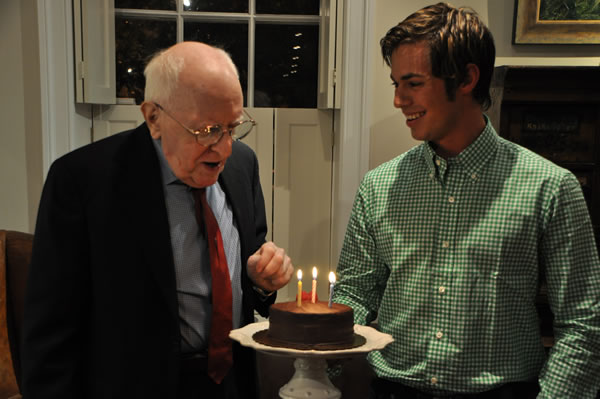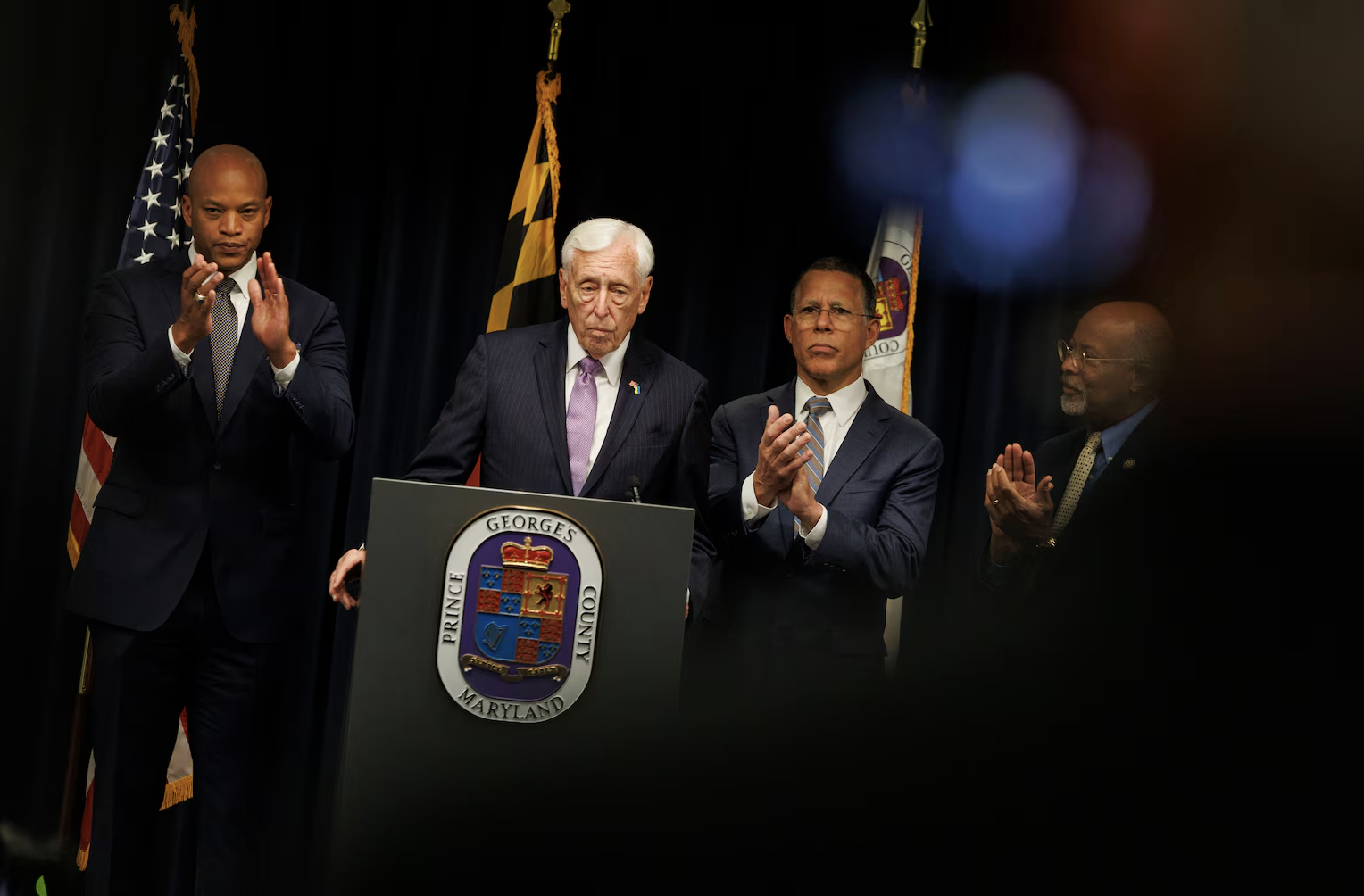Local
Kameny’s work finds new home
Library of Congress to preserve gay activist’s 70,000 letters, documents

Veteran D.C. gay rights leader Franklin E. Kameny has turned over more than 70,000 of his personal letters and documents to the Library of Congress, which will make them available to scholars and researchers.
At a ceremony scheduled for Oct. 6 at the library’s ornate Thomas Jefferson Building across the street from the U.S. Capitol, library officials were expected to join Kameny and many of his longtime friends and supporters to commemorate the library’s acquisition of the Kameny papers.
Kameny, 81, is credited with playing a lead role in launching the modern U.S. gay rights movement in the early 1960s after government officials discovered he was gay and fired him from his job as an astronomer with the Army Map Service.
In what gay activists see as a monumental twist of fate, the product of Kameny’s work on gay rights causes for nearly 50 years will now be placed in the same Library of Congress Manuscript Division that holds original documents of Frederick Douglas, Abraham Lincoln, Walt Whitman, Susan B. Anthony, and Bayard Rustin, among many other historic figures.
The Smithsonian Institution’s Museum of American History also has accepted a collection of 1960s-era protest and picket signs from the Kameny collection that Kameny and his supporters used for the nation’s first-ever gay rights demonstrations in front of the White House.
“After examining the Kameny papers, Manuscript Division historians judged them to be a rich and valuable resource that would allow researchers to more accurately understand the evolution of the homosexual rights movement into a significant social and political force,” said John Earl Haynes, a 20th century political historian at the Manuscript Division.
“The personal detail provided by the material on Mr. Kameny himself and those he assisted in similar circumstances is of unusual value,” Haynes said.
“Nearly 50 years go, the United States government banned me from employment in public service because I am a homosexual, Kameny said in a statement. “This archive is not simply my story,” he said. “It also shows how gay and lesbian Americans have joined the American mainstream story of expanded civil liberties in the 20th century.
“Today, by accepting these papers, the nation preserves not only our history, but marks how far gay and lesbian Americans have traveled on the road to civil equality,” he said.
Haynes said officials with the Manuscript Division first contacted Kameny about obtaining his papers in 1995 after they read an article about Kameny’s work by gay historian David K. Johnson. The article appeared in the official journal of the Historical Society of Washington.
Documents valued at $75,000
Earlier this year, a group of gay rights advocates and supporters founded the Kameny Papers Project, an ad hoc group created to raise money to facilitate the transfer of the papers to the library, according to gay public relations executive Charles Francis, the lead organizer of the project.
Francis said the group’s main purpose was to raise funds to buy the papers from Kameny — so that he could be compensated for his life’s work — and then donate the documents to the Library of Congress.
Its first task was to help Kameny assemble the papers in or orderly fashion and to have them appraised by a professional document appraiser. The appraiser determined the papers had significant historic value and were worth $75,000.
“With advancing years and limited means, Frank Kameny was not eligible for a federal tax deduction, as is common with such an extraordinary donation,” the Kameny Papers Project said in a statement.
Former California congressman and philanthropist Michael Huffington made the single largest contribution toward the purchase of the papers from Kameny, Francis said. He said the Human Rights Campaign, the nation’s largest gay political group, and the gay groups Gill Foundation, Bohnett Foundation, Log Cabin Republicans, Liberty Education Fund, and the National Gay & Lesbian Task Force also contributed to the fund.
Others firms and individuals that provided pro-bono services or contributions included Francis, New York gay businessman Donald Capoccia, the gay public relations firm Witeck-Combs Communications, the Joiner Law Firm, attorney Michele Zavos, and activists Gregory King, Elizabeth Koontz, and Ellen Ratner, according to the Kameny Papers Project.
Huffington and Capoccia have been longtime contributors to Log Cabin Republicans, and Francis is one of the founders of the Republican Unity Coalition, which has billed itself as a gay-straight alliance of prominent Republicans that support gay civil rights.
Kameny vs. J. Edgar Hoover
Gay historians have described Kameny as the architect of the modern U.S. gay rights movement, crediting him with transforming the fledgling “homophile” movement of the 1950s into an assertive civil rights struggle for gays and lesbians.
Most gay activists view the 1969 Stonewall riots in New York’s Greenwich Village as the spark that ignited a new phase in the gay movement that celebrated the slogan, “Out of the closet and into the streets.”
But gay historians like Johnson have credited Kameny with establishing, beginning in 1961, the philosophical and tactical underpinnings for the Gay Pride marches and political advocacy work that followed the Stonewall riots.
Kameny was the gay movement’s equivalent of Bayard Rustin, according to D.C. gay activist Rick Rosendall, in referring to Rustin’s role as a lead strategist for Martin Luther King in the black civil rights movement.
Shortly after being fired from his job at the Army Map Service, Kameny founded the Mattachine Society of Washington, the city’s first gay rights group. Kameny initially modeled the group after Mattachine Society chapters that had formed since 1950 in Los Angeles and other cities.
In some of his earliest papers now preserved at the Library of Congress, Kameny took exception to the prevailing view by Mattachine Society leaders that the groups should keep a low profile. Nearly all of the early Mattachine groups limited their work to research about homosexuality, educating the public on the subject, and helping other homosexuals adjust to society’s anti-gay prejudice, Johnson wrote in his 2003 book, “The Lavender Scare: The Cold War Persecution of Gays and Lesbians in the Federal Government.”
“Under Kameny’s leadership, the MSW would not remain underground and seek heterosexual authorities to speak on its behalf,” Johnson wrote. “On issues of homosexuality, Kameny argued, ‘we are the experts and the authorities.’” Johnson quoted him as saying.
Among Kameny’s innovations was the publication of a Mattachine Society of Washington newsletter, which the group sent to most top U.S. government officials, including President John F. Kennedy at the White House and all of Kennedy’s cabinet members, and then FBI Director J. Edgar Hoover.
Although most government officials did not appear to pay much attention to the newsletter, Kameny said he was startled in the summer of 1963 when FBI agent John A. O’Birne called Kameny by phone and requested to meet with him.
Kameny said he and Mattachine Society member Bob Bellanger had no idea why they had been summoned to a meeting with the FBI, an the two wondered whether a crackdown against Mattachine was in the works.
To their amazement, Kameny said, O’Birne politely asked him and Bellanger to remove Hoover’s name from the Mattachine Society mailing list, saying that Hoover did not wish to have his name on such a list. Kameny said he told O’Birne that he would have to consult other members of the group about this request and would get back to the FBI with the group’s response.
“I sent them a letter setting conditions for our removal of Hoover from our list,” said Kameny.
The conditions included a requirement that the FBI provide the group with the name of another FBI official to be placed on the newsletter list in place of Hoover and that the group would reserve the right to send Hoover a one-time mailing if an important issue arose.
The FBI never responded to Kameny’s letter. “Hoover stayed on our mailing list until the day he died,” said Kameny.
Hoover, who became notorious for keeping secret files on political activists and politicians – including President Kennedy – appears to have had the tables turned on him by discovering he was powerless to have him name removed from a homosexual rights group, gay activists have said.
In the 1970s and 1980s, Kameny served as an administrative counsel to gays who encountered problems obtaining or keeping security clearances issued by the federal government, becoming one of the nation’s recognized experts on gay-related security clearance issues. He also represented members of the military under investigation for being gay. In advising gay service members, Kameny coined the phrase, “Say nothing, sign nothing, and get counsel.”
He is also credited with creating the slogan, “Gay is Good,” which activists used in protest marches and Gay Pride festivals.
Virginia
Gay Va. State Sen. Ebbin resigns for role in Spanberger administration
Veteran lawmaker will step down in February

Alexandria Democrat Adam Ebbin, who has served as an openly gay member of the Virginia Legislature since 2004, announced on Jan. 7 that he is resigning from his seat in the State Senate to take a job in the administration of Gov.-Elect Abigail Spanberger.
Since 2012, Ebbin has been a member of the Virginia Senate for the 39th District representing parts of Alexandria, Arlington, and Fairfax counties. He served in the Virginia House of Delegates representing Alexandria from 2004 to 2012, becoming the state’s first out gay lawmaker.
His announcement says he submitted his resignation from his Senate position effective Feb. 18 to join the Spanberger administration as a senior adviser at the Virginia Cannabis Control Authority.
“I’m grateful to have the benefit of Senator Ebbin’s policy expertise continuing to serve the people of Virginia, and I look forward to working with him to prioritize public safety and public health,” Spanberger said in Ebbin’s announcement statement.
She was referring to the lead role Ebbin has played in the Virginia Legislature’s approval in 2020 of legislation decriminalizing marijuana and the subsequent approval in 2021of a bill legalizing recreational use and possession of marijuana for adults 21 years of age and older. But the Virginia Legislature has yet to pass legislation facilitating the retail sale of marijuana for recreational use and limits sales to purchases at licensed medical marijuana dispensaries.
“I share Governor-elect Spanberger’s goal that adults 21 and over who choose to use cannabis, and those who use it for medical treatment, have access to a well-tested, accurately labeled product, free from contamination,” Ebbin said in his statement. “2026 is the year we will move cannabis sales off the street corner and behind the age-verified counter,” he said.
Maryland
Steny Hoyer, the longest-serving House Democrat, to retire from Congress
Md. congressman served for years in party leadership

By ASSOCIATED PRESS and LISA MASCARO | Rep. Steny Hoyer of Maryland, the longest-serving Democrat in Congress and once a rival to become House speaker, will announce Thursday he is set to retire at the end of his term.
Hoyer, who served for years in party leadership and helped steer Democrats through some of their most significant legislative victories, is set to deliver a House floor speech about his decision, according to a person familiar with the situation and granted anonymity to discuss it.
“Tune in,” Hoyer said on social media. He confirmed his retirement plans in an interview with the Washington Post.
The rest of this article can be found on the Baltimore Banner’s website.
District of Columbia
Kennedy Center renaming triggers backlash
Artists who cancel shows threatened; calls for funding boycott grow

Efforts to rename the Kennedy Center to add President Trump’s name to the D.C. arts institution continue to spark backlash.
A new petition from Qommittee , a national network of drag artists and allies led by survivors of hate crimes, calls on Kennedy Center donors to suspend funding to the center until “artistic independence is restored, and to redirect support to banned or censored artists.”
“While Trump won’t back down, the donors who contribute nearly $100 million annually to the Kennedy Center can afford to take a stand,” the petition reads. “Money talks. When donors fund censorship, they don’t just harm one institution – they tell marginalized communities their stories don’t deserve to be told.”
The petition can be found here.
Meanwhile, a decision by several prominent musicians and jazz performers to cancel their shows at the recently renamed Trump-Kennedy Center in D.C. planned for Christmas Eve and New Year’s Eve has drawn the ire of the Center’s president, Richard Grenell.
Grenell, a gay supporter of President Donald Trump who served as U.S. ambassador to Germany during Trump’s first term as president, was named Kennedy Center president last year by its board of directors that had been appointed by Trump.
Last month the board voted to change the official name of the center from the John F. Kennedy Memorial Center For The Performing Arts to the Donald J. Trump And The John F. Kennedy Memorial Center For The Performing Arts. The revised name has been installed on the outside wall of the center’s building but is not official because any name change would require congressional action.
According to a report by the New York Times, Grenell informed jazz musician Chuck Redd, who cancelled a 2025 Christmas Eve concert that he has hosted at the Kennedy Center for nearly 20 years in response to the name change, that Grenell planned to arrange for the center to file a lawsuit against him for the cancellation.
“Your decision to withdraw at the last moment — explicitly in response to the Center’s recent renaming, which honors President Trump’s extraordinary efforts to save this national treasure — is classic intolerance and very costly to a non-profit arts institution,” the Times quoted Grenell as saying in a letter to Redd.
“This is your official notice that we will seek $1 million in damages from you for this political stunt,” the Times quoted Grenell’s letter as saying.
A spokesperson for the Trump-Kennedy Center did not immediately respond to an inquiry from the Washington Blade asking if the center still planned to file that lawsuit and whether it planned to file suits against some of the other musicians who recently cancelled their performances following the name change.
In a follow-up story published on Dec. 29, the New York Times reported that a prominent jazz ensemble and a New York dance company had canceled performances scheduled to take place on New Year’s Eve at the Kennedy Center.
The Times reported the jazz ensemble called The Cookers did not give a reason for the cancellation in a statement it released, but its drummer, Billy Hart, told the Times the center’s name change “evidently” played a role in the decision to cancel the performance.
Grenell released a statement on Dec. 29 calling these and other performers who cancelled their shows “far left political activists” who he said had been booked by the Kennedy Center’s previous leadership.
“Boycotting the arts to show you support the arts is a form of derangement syndrome,” the Times quoted him as saying in his statement.
-

 Sponsored5 days ago
Sponsored5 days agoSafer Ways to Pay for Online Performances and Queer Events
-

 District of Columbia4 days ago
District of Columbia4 days agoTwo pioneering gay journalists to speak at Thursday event
-

 Colombia3 days ago
Colombia3 days agoBlade travels to Colombia after U.S. forces seize Maduro in Venezuela
-

 a&e features4 days ago
a&e features4 days agoQueer highlights of the 2026 Critics Choice Awards: Aunt Gladys, that ‘Heated Rivalry’ shoutout and more




















